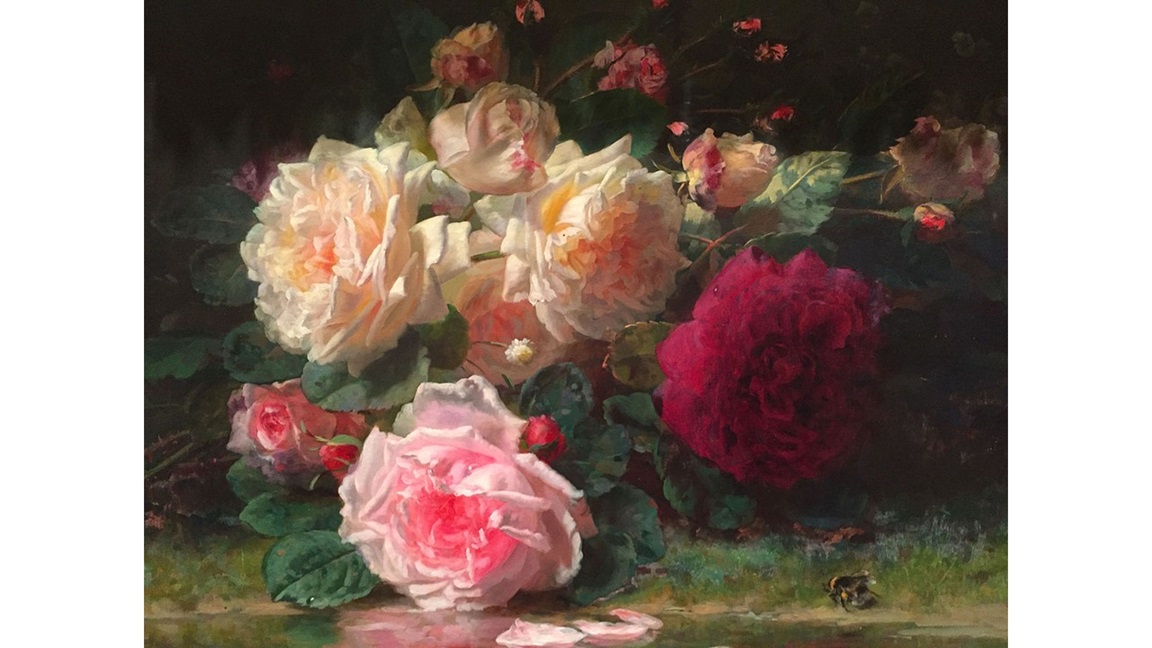for Mark F. Stone and all his pets
The duck has special properties:
Like water off its back;
If only we as humans could
Perfect the duck’s dry knack.
It’s not that water isn’t there
Or ducks just cannot drown,
But always buoyant in a storm,
They’re always up when down.
They’re harmless too and that’s a plus
In worlds of wild savages;
Skimming surfaces, mocking deeps;
And know a duck who ages?
The duck, then, is a paradigm
How we in life might be:
Forget the lion—courage floats
To evenly greet the sea.
James Sale, FRSA is a leading expert on motivation, and the creator and licensor of Motivational Maps worldwide. James has been writing poetry for over 40 years and has seven collections of poems published, including most recently, Inside the Whale, his metaphor for being in hospital and surviving cancer, which afflicted him in 2011. He can be found at www.jamessale.co.uk and contacted at james@motivational maps.com. He is the winner of First Prize in the Society’s 2017 Competition and Second Prize in the Society’s 2015 Competition.

















It is fascinating to read a poem of James Sale which is all lightness and wit as a counterpoint to the infinitely more serious cantos. This is indeed fine homage for an animal which is perhaps ignored too often by some.
It would never even have occurred to me honour the duck in this way, as one of the great high points of my existence was the obligatory enjoyment of pressed duck one unforgettable evening at the Tour d’Argent, the very reason for my friends’ insisting on taking me there many ago. I was served to look like it had not been touched complete with feathers perfectly arranged—we were aghast when the maitre d’hotel began to disassemble what looked more like a painting than something one would eat!
In Santa Fe, New Mexico, we are blessed to have chef Xavier Grenet, an immigrant from Paris, whose restaurant, l’Olivier, offers a gorgeous cassoulet and duck is the star of this treasure of the Provençal cuisine. Not bad for so poor and remote a region such as ours out here in the high southwestern desert!
I think we should all endeavor to keep duck fat always in supply whenever possible, as it is the most digestible and beneficial of all the fats.
Do you know that you can store duck as confit for a whole year without refrigeration (which is why confit was popular in the Middle Ages)?
Thanks Joseph for your kind and highly informative comments; I had no idea it had the most digestible and beneficial of all fats! There I am on my high moral horse about some duck floating out in the Amazon estuary and holding its little head up, and there you are hunkering down with some Middle Ages’ confit. I guess the great God gave us both the emblematic and the delicious at the same time! A lesson, I suspect, that has incarnational overtones! I did provide one weird line where I substituted a dactyl for the iamb, but hey, it’s a wild world – another sign of the imperfect all around us. Maybe one day I shall get to your high southwestern desert, food sounds very good!
Yes, but the dactyl has more to do with how the poem sits on the tongue as opposed to the mute page. I do hope that others who comment here will not fall into the shop-worn parochialism of counting beats which I have seen all to often elsewhere—with no one, inversely, to criticize those who truly violate the metrics of their own, much inferior, productions.
Dear James Sale –
It is always a pleasure to read your work. Whether philosophical prose or .somethiong with a lighter touch such as this, you never fail to come down on the side of the substantive. I find it delightful .that you seem to be calling on ducks to give us advice.
Recently I have been going over some of my own poems in preparation for a poetry reading, and correcting a few faults.
Guess what? I found several with the same problem as your duck poem.
It’s a minor fault, repetition of a word, but still something worth correcting. Repetition of the word “always” occurs in lines seven and eight is as follows: “_But always buoyant in a storm/ they’re always up when down .”
Line .seven could easily be changed to “But, ever buoyant in a storm”. or something similar, and something similar be done with line eight.
Hope you do not think this is .out of line for me to suggest this. – I am always your fan.
Hi Sally, thanks for your appreciation, which means a lot to me; and I am not at all offended by constructive feedback. The question is, whether it is a ‘fault’, since repetition in various guises, for example ‘refrain’ or ‘anaphora’ or even identical rhyme, can be the very strength and life blood of poetry. I was conscious of doing it, and felt that I was emphasising by re-linking two synonymous words, buoyant and up, which is also a kind of repetition. However, one cannot be the judge in one’s own case – it is always – that word again – important to know how others perceive it: blemish or adornment? I’d be interested in other experts’ (for you are one) views. I could be persuaded to alter it – thank you, really well-spotted.
In regard to “always,” I don’t think it matters much, but because I favor lexical variety, if I had written it I probably would have done it as Sally suggests. I’ve spent a lot of time around ducks. A friend of mine had a couple dozen of them, which I took care of when I watched his house. They are cowards and would never let me get closer than six or eight to them — unless I had some food in my hand, for then they would come up and eat right out of it. Ducks are endearing and every bit as silly as geese. Throw them some earthworms, and then just see what happens!
“six or eight feet to them,” that is.
Thanks CB – appreciate your comments. Must try the earth worm trick: imagine one is in danger of being stampeded by ducks! They are fascinating creatures – you couldn’t ‘invent’ them, but there they are, in the their ducky way, being ducks!
I adore ducks and this quirky duck poem does these fun, feathered creatures every justice. The world needs more ducks and duck poems.
All true, Susan, but the duck world is a veritable rape culture. The drakes are relentless. I have read, however, that the hens have the anatomical ability to reject the semen of drakes they find unworthy. The subject is much deeper than even James Sale supposed.
Thanks CB – I was attempting to keep the graphic horrors confined to my Canto poems, but reality will out, and perhaps I must concede that ducks are not as perfect as I imagine; still, I love the little critters, and will go on promoting their cause, for they have a destiny too – at least in my poems!
Well thank you C.B. for that enlightenment! As one who, as a result of James’ poem, resolved to regard ducks in a different light I now find that light deepening substantially! I found myself pondering upon where the human race would be if it were endowed with a similar anatomical ability?
Hi Susan – thanks – this is such a positive response, I shall have to consider writing more duck poems; indeed, let’s encourage everyone to write more duck poems. They are fascinating creatures with almost a spiritual dimension to their being. The last line of this poem derives from my being on holiday in Cornwall many years ago, and seeing ducks float down on a small stream/river and go straight into the sea which stretched out in its vastness – yet they were so imperturbable and confident. Wonderful. Thanks again.
Ah… Cornwall, one of my favourite places. I can picture the imperturbable-duck scene. Wonderful! I am constantly amazed at the variety of ducks here on the coastal plains of Texas. They bob and dive in temperatures ranging from hellishly hot to teeth-chatteringly cold with the same zest and zeal. Courage floats, indeed!
Ah Susan, Texas, that’s a magic word, for my wife has always wanted to go there, and we haven’t yet. But now we know about these amazing ducks, we have an added incentive to visit! Let’s hope soon – love that description of the teeth-shatteringly cold: have transferred the image to my picture of Texan ducks!! Those rip-roaring little devils!!
I had never thought of ducks as courageous animals, but your poem does highlight their ‘up when down’ capacity, and willingness to forge ahead.
Although your poem is lighthearted, it isn’t light on substance, or in providing food for thought.
Thanks David – that’s nice of you to say that. In a way, it’s nature itself which, when we reflect on it, provides the substance for our deeper thoughts. We see something amazing in the heart of even the simplest things. The more I look, the more in awe I am of creation. Clearly, you are too.
I am with you, Mr. Watt, on the “moral” of the poem. Perhaps it is timely, as buoyancy is needed to stay afloat as the nation navigates the difficult waters of the present pandemic.
Thank you Joseph – yes, the duck it seems is – so far an animals are concerned – our role model to float on the waters of troubles, to skim the desperate deeps, and face the ocean unafraid. Of course, like you, I also take the view that the Lord is also and always a ready help in times of trouble, and as the waters rise up and roar!
It’s a nice poem James . Simple yet effective in that it brings to the surface a truth that is self-evident yet seldom contemplated. I’m sure I shall look at ducks in a new light from now on!
James, It is a wonderful poem, and I am honored that you dedicated it to me. Best wishes to you! Mark
Thanks Rod – so glad Ducks are getting a new lease of life from the poem!!
Thanks Mark – the poem was for you, possibly inspired by you: the Pterdactyls you write about I had never considered in that way before, so from the sublime Pterodactyls to the more humble duck, I thought it appropriate to give them a mention. Look forward to more of your contributions in due course and am delighted to learn that you will be appearing at the summer SCP event – I wish I could re-introduce you all over again as I did last summer! Have a great time.
This is a beautiful and simplistic poem that nonetheless says a lot about how we live our lives, and I think could only have been written by someone who has experienced life’s turmoils, or rather, “storms” and “deeps”, and emerged on the other side. I agree with Charles MacKenzie that it is intriguing to read such a lighthearted poem from James, given his usual penchant for the more painful and soul rending topics.
Dear Mindflayer, thanks for your kind observations. You have always been a great supporter of my work and I really appreciate it, given what a fine novelist you are yourself.
To a UK Verse-Maker
Of course, a duck’s quack echoes; that is not so laudable;
although the echo, if one listens, seems inaudible.
Acoustic scientists at Salford University,
when testing Daisy Duck, found her quack echoed quietly,
so quietly, in fact, the fading sound was hard to hear;
in the reverberation chamber, scarcely made a stir.
The echo had been swallowed by the very quack itself;
where her quack stopped and echo started was quite hard to tell.
Faint and not found near sound-reflecting surfaces outdoors,
it’s difficult to catch duck echoes even on the moors.
Dear Birdee Euclaws – I am in awe of the appropriateness of this, your name. For certainly ducks have euclaws as by that divine etymology their feet are transformed. Much appreciated – from your UK versifier!
James, it has just occurred to me that you have the sight-rhyme of “savages” and “ages” in the third quatrain. That’s perfectly OK, as it is an acceptable resource of rhyming poems.
But I have remembered that the original English term for those living in a wild state was “selvages” (etymologically, “those in the forest”), and I believe it rhymed perfectly with “ages.” American Indians are referred to as “selvages” in many 17th-century colonial chronicles from New England and Virginia. This was from the Latin /silvaticum/,but for some reason we later dropped it and borrowed the French reflex /sauvage/.
I certainly don’t suggest that you change /savages/ to /selvages/. The poem is fine as it is. It’s just an example of how what rhymed at one time may not rhyme any longer.
Hi Joseph, thank you so much for this and you are right; and I guess as poets we have to watch this shifting in pronunciation; as a matter of fact of course we have already had several debates on these pages about how English and American pronunciations affect a poem, especially where the pronunciation seems from the spelling trisyllabic but turns out to be in one country bi-! Your reference to ‘selvages’, which incidentally I did not know, reminds me of the title of TS Eliot’s The Dry Salvages, and the apparent pronunciation of this to rhyme with ‘assuages’ which I have always found slightly unnatural as an English person; but apparently this is the correct way since it is an American landmark. All our rhymes are for our times, and we can but hope that should any of our works still be read in 400 years’ time, we will be forgiven as those living then try to wrest the sound from the symbols on the page (assuming all that’s digital has long gone!) All the best.
Ha, ha, ha – let’s not go there Rod – or if you do, make it a poem!
James, I love your ducks. You’re an inspiration:
In Need of a Quack!
When I’m muddled, befuddled and down on my luck,
frizzled and frazzled and coming unstuck
on a knife’s edge of strife in a life rife with schmucks,
I reach for the bread and head for the ducks:
a bevy of feathered clowns of the lake,
whose beak-dipping ripples drown frowns in the wake
of a quacking attack on the bake I forsake
for the crumb-dunking charm of five hens and a drake.
I’m puffed up with praise for the pluck and the cluck
that bucks up my day when my day starts to suck;
my flurries of worries will not run amok
all the time I can muster a crust for a duck!
Thank you!
Ha ha! Brilliant Susan -as always 🙂